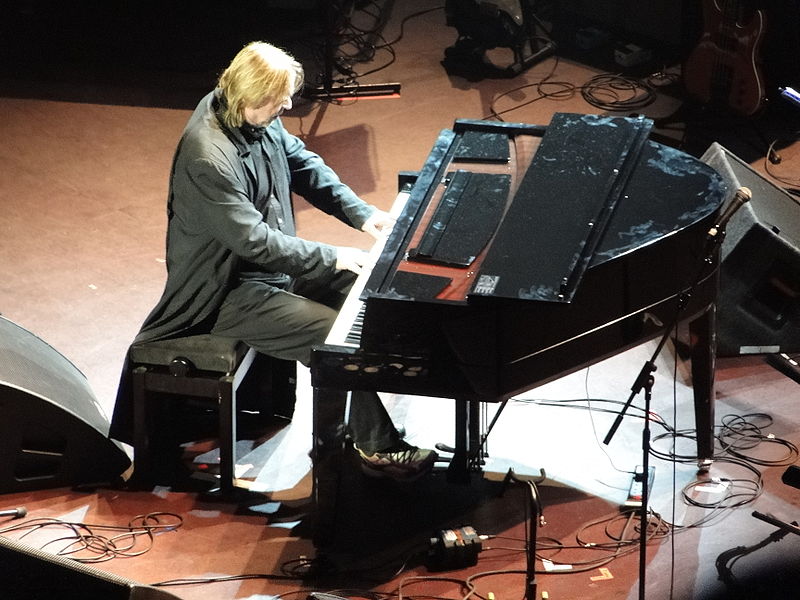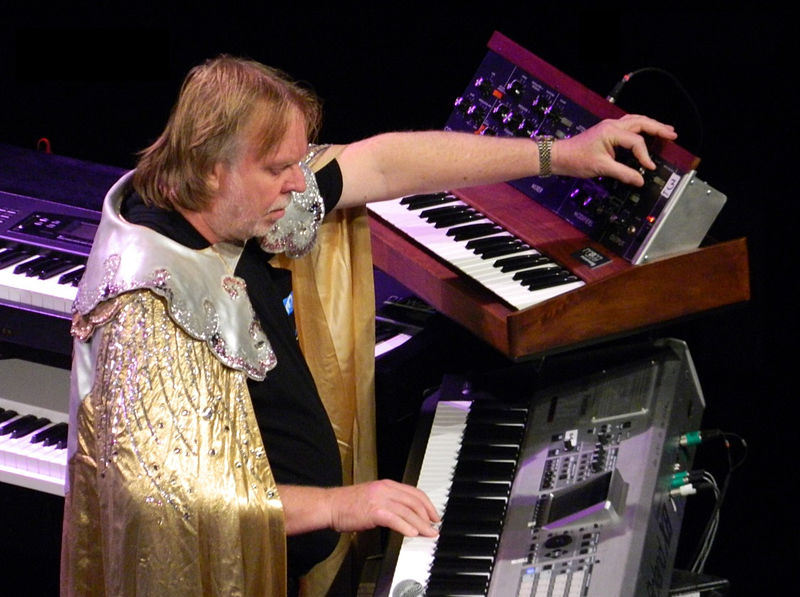BIOGRAPHICAL DETAILS
Full Name: Richard Christopher Wakeman
Description: Keyboardist, Composer, UK
Known For: Yes (Band)
Instruments: Keyboard
Music Styles: Rock, Progressive Rock
Location: United Kingdom
Date Born: 4th May 1955
Location Born: Perivale, London, United Kingdom
Photo Comments: The above image is intended for those who wish to reuse material (text and/or graphics) from the Wikipedia projects — on their own website, in print, or otherwise. It focuses on Commons as this is explicitly a collection of reusable media.
CONTACT DETAILS
Web Site: www.rwcc.com
Other Links: See below:
YOUTUBE VIDEO
BIOGRAPHICAL PROFILE
Rick Wakeman
Richard Christopher “Rick” Wakeman (born 18 May 1949) is an English keyboardist, songwriter, television and radio presenter, and author. He is best known for being the former keyboardist in the progressive rock band Yes and his solo albums from the 1970s. In recent years, he became known for his contributions to the BBC comedy series Grumpy Old Men, his radio show on Planet Rock named Rick’s Place that aired from 2005 to 2010.
Wakeman left the Royal College of Music in 1969 to become a full-time session musician where he played on songs by David Bowie, T. Rex, Elton John, Cat Stevens, and Black Sabbath. In 1970, he joined the Strawbs for three albums before joining Yes for two runs from 1971 to 1980, playing on their successful albums Fragile (1971), Close to the Edge (1972), Tales from Topographic Oceans (1973), Going for the One (1977), and Tormato (1978). In 1988, Wakeman co-formed Anderson Bruford Wakeman Howe, which led to his return to Yes from 1990 to 1992. He returned twice from 1995 to 1997 and 2002 to 2004.
Wakeman began his career as a solo artist in 1973. His first three albums are his most successful and well known: The Six Wives of Henry VIII (1973), Journey to the Centre of the Earth (1974), The Myths and Legends of King Arthur and the Knights of the Round Table (1975). Wakeman has released over 100 solo albums that has sold 50 million copies worldwide, ranging from pop, solo piano, film scores, Christian, ambient, and New-age music. He has made many television and radio appearances throughout his career. He has written three books; an autobiography and two memoirs. He is the father of keyboardists Adam Wakeman and Oliver Wakeman.
Rick Wakeman was born Richard Christopher Wakeman on 18 May 1949 in the west London suburb of Perivale. His parents, Cyril Frank Wakeman and Mildred Helen Wakeman, lived in nearby Northolt. Cyril played the piano in a dance band while he was in the army, and worked a building suppliers where he worked up from office boy at fourteen to one of its board of directors. Mildred worked at a removal firm. In 1954, Wakeman attended Little Wood Harden Infants School in Greenford followed by Drayton Manor Park Grammar School in Hanwell in 1959.
When Wakeman turned seven, his father arranged weekly piano lessons with Dorothy Symes, which lasted eleven years. She recalled Wakeman “passed everything with a distinction,” an “enjoyable pupil to teach, full of fun and with a good sense of humour,” but noted his lack of self-discipline in practice. Symes entered Wakeman in music competitions around London and went on to win one hundred certificates and twenty medals and cups.
At fourteen, Wakeman joined the Atlantic Blues, a local blues band that earned a year’s residency in Neasden. During this time, he formed Curdled Milk, a joke on the band Cream, to play at the annual Drayton Manor school dance. In 1966, he joined The Concordes, later known as the Concord Quartet, playing dance and pop songs at local events with his cousin Alan on saxophone and clarinet. Wakeman used the money earned from gigs to buy his first electronic instrument, a Pianet. In his teens, Wakeman attended church and became a Sunday school teacher. He was baptised at eighteen.
Wakeman described himself at Grammar school as “a horror … I worked hard in the first year, then eased up.” He wished to take up music full-time and attend the Royal College of Music in London, but he needed to pass eight music exams to earn his A-levels, which required, as his mother remembered, “to do two years’ work in ten months.” Wakeman’s school music teacher gave him the determination to work after betting him ten shillings that he would not succeed. Wakeman passed, and received the money from his teacher. Wakeman studied for his grades as he refused his father’s offer to work at his building company if he failed. During his A-level studies, Wakeman played in the Ronnie Smith Band, a dance group at the Top Rank ballroom in Watford. He met singer Ashley Holt who would play on many of Wakeman’s future albums and tours.
In 1968, Wakeman secured a place at the college where he studied the piano, clarinet, orchestration, and modern music. He intended to become a concert pianist. He began on a performers course before switching to a teachers course. Wakeman took a relaxed attitude to his studies, drinking in pubs and missing lectures. He spent most of his spare time at a music shop in Ealing run by Dave Simms who knew the saxophonist in the Top Rank band. Wakeman found himself at his first recording as a session musician when guitarist Chas Cronk came in one morning in need for an organist and brass arranger for members of the Ike & Tina Turner band. It was Wakeman’s first time in the studio, and Wakeman met producers Tony Visconti, Gus Dudgeon, and Denny Cordell at the session. Impressed with his work, Cordell offered him sessions for Regal Zonophone Records.
Wakeman began his career as a solo artist during his first run with Yes. He released his first studio album, The Six Wives of Henry VIII, in January 1973. Recording took place from February to October 1972 with an advance of £4,000 from A&M Records. The album is instrumental with its concept based on Wakeman’s interpretations of the musical characteristics of the wives of Henry VIII. He used seven musicians from Yes and the Strawbs to play on the record that cost around £25,000 to make. On 16 January 1973, the album was previewed with Wakeman performing excerpts of the album on the BBC television music show, The Old Grey Whistle Test. An audience of around 10 million planned to watch a controversial film about American pop figure Andy Warhol, but was temporarily banned for broadcast. Wakeman said, “It seems most of them, rather than watch repeats, switched over to Whistle Test and saw my preview of Henry … and suddenly it seemed as if the whole country had discovered my music … it was a tremendous break.” The album was released on 23 January and reached number 7 in the UK and number 30 in the US. Time magazine named the record one of the best pop albums of the year.
Wakeman’s success with Yes continued to grow in 1973. Their first live album, the triple-LP Yessongs, was released in May and went to number 7 in the UK and went on to sell one million copies in the US. The album includes his solo spot, Excerpts from “The Six Wives of Henry VIII”. Wakeman is featured in the band’s concert film, Yessongs, filmed in 1972 at the Rainbow Theatre. At the 1973 Melody Maker readers poll awards, Wakeman came out first in the top keyboardist category.
Although Wakeman is a noted player of the grand piano, electric piano, pipe organ, Hammond organ, Minimoog and many later models of synthesiser, he is well known as a proponent (for a time) of the Mellotron – an analogue electronic musical instrument that uses a bank of pre-recorded magnetic tape strips, each of which is activated by a separate key on its keyboard and lasts approximately 8 seconds. Wakeman featured playing this instrument, to varying degrees, on the David Bowie track Space Oddity, the Yes albums Fragile, Close to the Edge and Tales From Topographic Oceans, as well as the solo albums The Six Wives of Henry VIII and White Rock. An urban legend claims that Wakeman got so frustrated with one Mellotron that he poured petrol on it and set fire to it, but this was debunked in a 2010 interview.
He subsequently worked with David Biro to develop the Birotron, which used the then popular 8-track cassette format rather than tape strips. Because of the advent of digital keyboards at that time, and expensive components used in the instruments’ manufacture, the Birotron was never a commercial or technical success. Only 35 Birotrons were produced. These days, he can be found with more modern instruments such as the Roland Fantom, Korg Kronos, Korg M3, and the Korg Oasys.
Personal life
Wakeman has been married four times. On 28 March 1970, Wakeman married Rosaline Woolford at twenty years of age, and had two sons, Oliver (b. 26 February 1972) and Adam (b. 11 March 1974). They were divorced in 1977, and he married studio secretary Danielle Corminboeuf in January 1980, in the West Indies,[99] with whom he had one son, Benjamin (b. 1978). He had a daughter, Jemma Kiera (b. 1983), with former Page 3 model Nina Carter and the two married in 1984, followed by the birth of their son, Oscar (b. 1986).
He had a renewal of his Christian faith, which began around the time of his marriage to Carter. They were divorced in December 2004. He had a daughter, Manda (b. 9 May 1986), with his long-time friend, designer and seamstress Denise Gandrup, whom he first met in 1972. She designed many of Wakeman’s stage outfits, including his famous capes. In 2011, Wakeman married Rachel Kaufman.
In his twenties, Wakeman suffered three heart attacks. The first occurred after a performance of Journey to the Centre of the Earth at Crystal Palace Park on 27 July 1974. In 1980, he was misdiagnosed as having rheumatoid arthritis in his hands. He only found out in 2008 that the pain he was suffering was just due to overwork after a period of lack of keyboard practice.
A former smoker and self-confessed alcoholic, Wakeman quit smoking in 1979 and has been teetotal since 1985.
A Master Freemason, he is a member of Chelsea Lodge No. 3098, the membership of which is made up of entertainers. In 2009, Wakeman became a Patron of Tech Music Schools. As of 2014, he is the King Rat of the showbusiness charity the Grand Order of Water Rats. In 2014, he appeared in The Life of Rock with Brian Pern as himself.
LINKS:
He rejoined “Yes” for their album in 1977 but left the following year.
Wakeman has performed with the best of the best including Elton John, John Williams, Lou Reed, Cat Steven’s etc.
He has confessed he is a former alcoholic and has had several heart attacks when in his twenties.
Wakeman is Honorary President of the highly acclaimed “Classic Rock Society” founded in 1991.
Rick Wakeman is a master of music and is as popular as ever to millions of fans.
Noted Albums
THE SIX WIVES OF HENRY THE VIII – 1973
JOURNEY TO THE CENTRE OF THE EARTH – 1974
THE MYTHS AND LEGENDS OF KING ARTHUR AND THE KNIGHTS
OF THE ROUND TABLE – 1975.
LINKS:
- Rick Wakeman’s Communication Centre
- Rick Wakeman’s Official Press Photos
- Rick Wakeman
at the Internet Movie Database
From Wikipedia, the free encyclopedia


